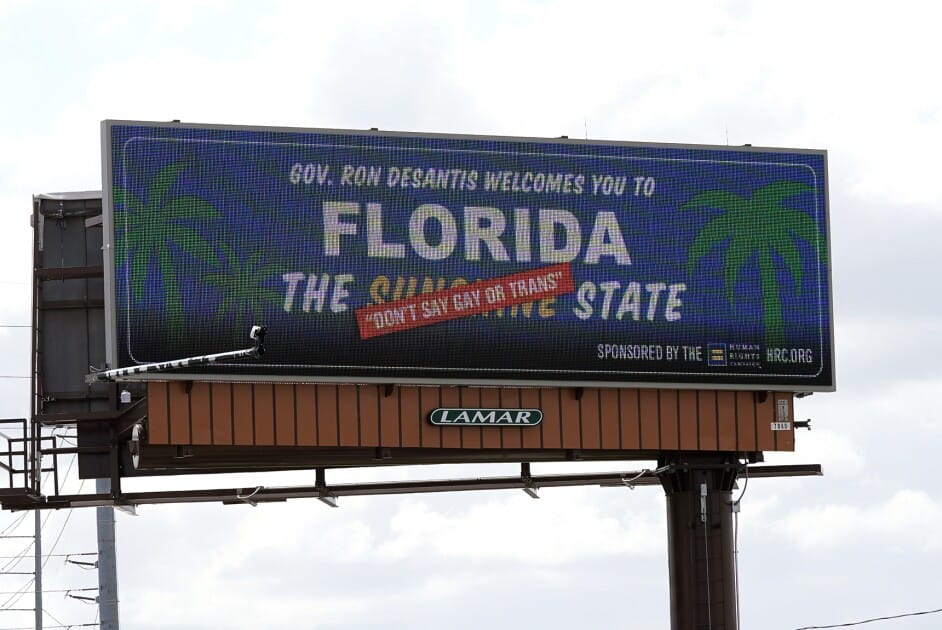A federal appeals court on Wednesday ruled against a transgender female teacher who challenged a Florida law that bars K-12 education employees from using their chosen personal titles or pronouns if they do not correspond to their sex assigned at birth.
A 2-1 panel of the U.S. Court of Appeals for the 11th Circuit, in Atlanta, said the teacher’s First Amendment rights were not violated by the 2023 law because it imposes a restriction on her in-class speech as a government employee, rather than her speech rights as an individual.
“When a public school teacher addresses her students within the four walls of a classroom—whether orally or in writing—she is unquestionably acting ‘pursuant to her official duties,’” the majority said, quoting from a U.S. Supreme Court decision from 2006, Garcetti v. Ceballos, which makes up part of the key test for analyzing public-employee speech under the First Amendment and held that most job-related speech by such employees is not protected.
“Interacting with students during class time, quite literally, is a teacher’s ‘official duty,’” said Judge Kevin C. Newsom, a first-term appointee of President Donald Trump.
The dissenter, Judge Adalberto Jordan, a President Barack Obama appointee, said the Florida law was one of several attempts by the state at “speech orthodoxy,” some of which have been struck down, he noted.
The teacher “has substantially demonstrated that her use of her preferred personal title and pronouns constitutes private speech on a matter of public concern rather than government speech,” Jordan said.
Teacher sought to wear a ‘she/her’ pin in class
The law at issue is one of several measures backed by Gov. Ron DeSantis, a Republican, and conservative lawmakers in Florida aimed at transgender individuals.
The challenged law prohibits public school teachers, employees, and contractors from providing to a student “his or her preferred personal title or pronouns if such preferred personal title or pronouns do not correspond to that person’s sex.” Teachers who violate the law face loss of their certification, among other penalties.
The law was challenged by Katie Wood, an algebra teacher at Lennard High School in the Hillsborough County school district. Wood was assigned male at birth and transitioned in 2020. She began using the honorific “Ms.” and the pronouns “she” and “her.” She also wanted to wear a “she/her” pin at school, including in her classroom.
A federal district court granted a preliminary injunction, ruling that Wood’s use of her chosen title and pronouns was speech as a private citizen, not as a government employee.
The lower court went on to hold that the teacher’s speech touched on a matter of public concern and that her interest in expressing herself outweighed the state’s interest in promoting workplace efficiency.
In its July 2 decision in Wood v. Florida Department of Education, the 11th Circuit panel reversed the district court. The majority said there is still much that the 11th Circuit has not decided about the scope of a public school teacher’s official speech for First Amendment purposes. And the Florida law applies only to interactions with students, so it wasn’t deciding whether she would be barred from using her chosen pronouns with colleagues in the teachers’ lounge, Newsom said.
“Our decision is a narrow one,” he said. “We hold only that when Wood identified herself to students in the classroom using the honorific ‘Ms.’ and the pronouns ‘she,’ ‘her,’ and ‘hers,’ she did so in her capacity as a government employee, and not as a private citizen.”
Dissent distinguishes between curricular and non-curricular teacher speech
Jordan, the dissenting judge, said a teacher’s titles and personal pronouns are “significant markers of individual identity. They exist outside of, and do not depend on, the school or the government for their existence.”
Jordan said he would draw a distinction between curricular speech, would would be government speech governed by the Garcetti decision, and non-curricular speech, such as pronouns.
“We should be wary of holding that everything that happens in a classroom constitutes government speech outside the ambit of the First Amendment,” Jordan said. “Those who wield the power of the government today and are on one side of the gender and culture wars will be the ones at risk of being compelled to speak against their beliefs, or silenced, when their opponents are in charge.”
The Florida case is a twist on other legal cases involving gender titles and pronouns. Many school districts have policies requiring teachers to use a transgenders student’s chosen name and pronouns. The Trump administration this year removed guidance advanced by President Joe Biden’s administration that supported and made it so Title IX required such policies.
Meanwhile, another federal appeals court is weighing the case of an Indiana teacher who refused on First Amendment grounds to use transgender students’ chosen names and pronouns. Many legal observers expect that case to go to the Supreme Court.
The Florida teacher, meanwhile, could seek a rehearing before the full 11th Circuit or could appeal to the Supreme Court.
2025-07-02 20:25:47
Source link

